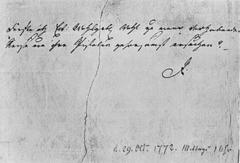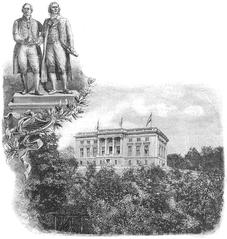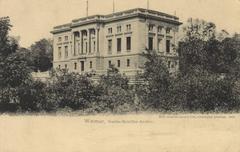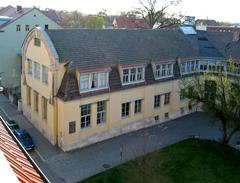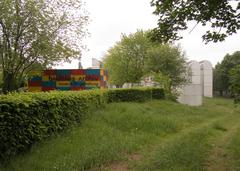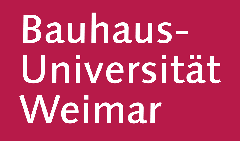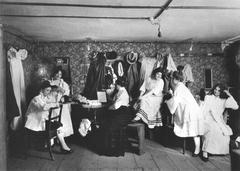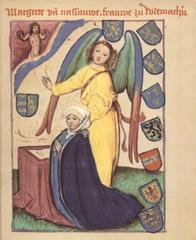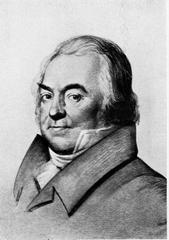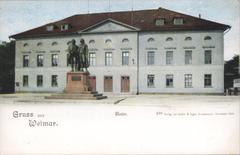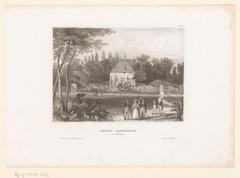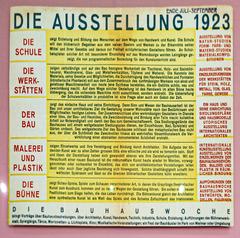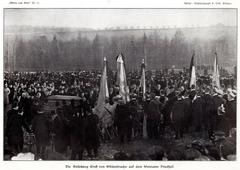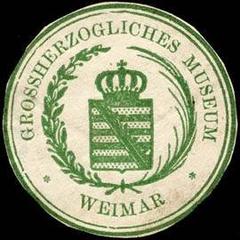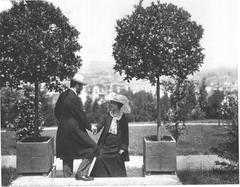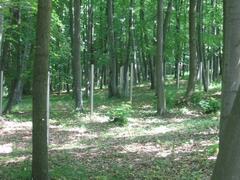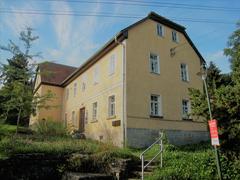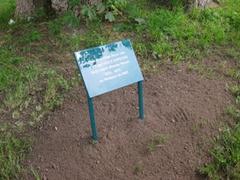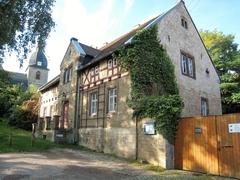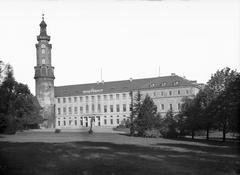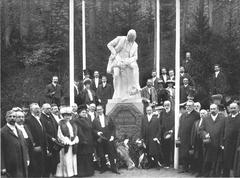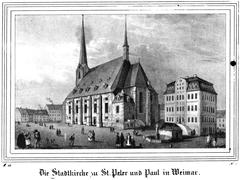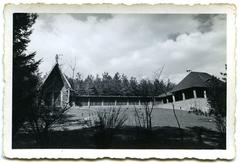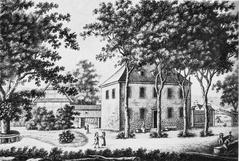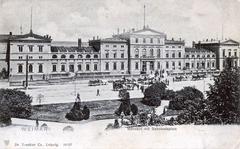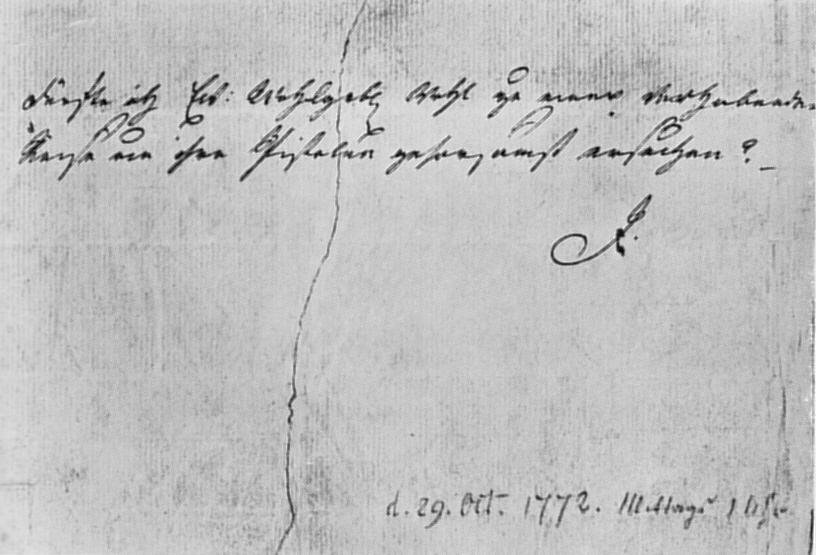
Goethe and Schiller Archives Weimar: Visiting Hours, Tickets, and Comprehensive Guide
Date: 14/06/2025
Introduction
Located in the heart of Weimar, Germany, the Goethe and Schiller Archives (Goethe- und Schiller-Archiv) are a cornerstone of German literary and cultural history. Founded at the end of the 19th century by Grand Duchess Sophie of Saxe-Weimar-Eisenach, the archives were initially established to preserve the legacy of Johann Wolfgang von Goethe and later expanded to include the estate of Friedrich Schiller, along with numerous other prominent figures from the Classical, Romantic, and modern eras. Housing approximately five million documents—including manuscripts, letters, diaries, and personal papers—the archives provide invaluable insight into the intellectual heritage of Germany and Europe. The building itself, designed in a neoclassical style reminiscent of the Petit Trianon, stands as a testament to Weimar’s cultural ambitions and forms part of the UNESCO World Heritage Site “Classical Weimar” (Klassik Stiftung Weimar, Wikipedia, UNESCO).
Whether you are a literature enthusiast, scholar, or cultural traveler, this guide provides all the essential information—visiting hours, ticketing policies, accessibility, highlights of the collections, and tips for exploring Weimar’s rich historical landscape.
Table of Contents
- Introduction
- Historical Origins and Development
- Expansion of the Archives and Key Figures
- Architecture and UNESCO Recognition
- Collections and Research Facilities
- Visitor Information
- Practical Tips and FAQs
- Conclusion
- Sources and Further Reading
Historical Origins and Development
The Goethe and Schiller Archives trace their beginnings to the late 1800s, following the death of Walther von Goethe, Goethe’s last grandson, who left his grandfather’s estate to Grand Duchess Sophie of Saxe-Weimar-Eisenach. The original Goethe Archive was inaugurated in 1896 as Weimar’s last major work of historicism. In 1889, the Schiller estate was added, thanks to a donation from Schiller’s descendants, and the archive was renamed (Klassik Stiftung Weimar, Weimar.de).
With the combined estates of Goethe and Schiller, the archive soon became a repository for further literary treasures, eventually encompassing the collections of Herder, Wieland, and other luminaries. Throughout the 20th century, the archives expanded further, acquiring the estates of figures such as Georg Büchner, Franz Liszt, and Friedrich Nietzsche.
Expansion of the Archives and Key Figures
Today, the archive manages more than 150 personal collections and 14 institutional collections, including the estates of Göttfried Herder, Christoph Martin Wieland, Bettina von Arnim, Franz Liszt, Friedrich Nietzsche, and the institutional records of organizations such as the Allgemeiner Deutscher Musikverein and Goethe-Gesellschaft. Highlights include original manuscripts of Goethe’s “Faust” and Schiller’s “Demetrius,” and thousands of letters, diaries, and rare unpublished works (WhichMuseum).
Architecture and UNESCO Recognition
The archives’ neoclassical building, constructed between 1893 and 1896 and designed by Otto Minckert, was inspired by the Petit Trianon at Versailles. Its panoramic location atop a gentle hill offers views over the Ilm River and Weimar’s old town, adding to its historic and aesthetic appeal (WhichMuseum, Ausflugsziele Weimar). Recognized as a UNESCO World Heritage Site in 1998 as part of the “Classical Weimar” ensemble, the archives are celebrated for their pivotal role in preserving and showcasing the ideals of Weimar Classicism (One Million Places, UNESCO).
Collections and Research Facilities
Manuscript and Archival Holdings
- Goethe’s Literary Estate: The world’s most complete collection, including over 6,000 autograph manuscripts, more than 35,000 letters, diaries, scientific notebooks, and official court documents.
- Schiller’s Estate: Drafts of major plays, 7,000+ letters, personal notes, and family papers.
- Other Figures: Holdings include Herder’s manuscripts, Wieland’s literary works, Charlotte von Stein’s papers, and materials from later figures such as Liszt, Wagner, Nietzsche, and representatives of the Bauhaus movement.
- Special Collections: First editions, annotated books, portraits, musical scores, and rare prints.
Research Facilities
- Reading Room: Open to registered researchers for in-depth study; advance registration required.
- Conservation Labs: Equipped for document restoration and digitization, ensuring long-term preservation.
- Digital Access: Ongoing digitization enables remote access to many documents, supporting scholarship worldwide (Klassik Stiftung Weimar).
Visitor Information
Visiting Hours
- Monday to Friday: 9:00–18:00
- Saturday and Sunday: 11:00–16:00
- Reading Room: Monday 13:00–17:00, Tuesday–Thursday 9:00–17:00, Friday 9:00–12:00
- Closed: Public holidays and during seasonal adjustments; always check the official website for current hours.
Tickets and Admission
- General Admission: Free of charge.
- Special Exhibitions or Events: May require tickets, typically €5–10.
- Guided Tours: Available on select days, in German and English, with advance booking recommended.
Accessibility
- The building is partially accessible; step-free access to main exhibition areas, with assistance available. Some historic features may limit access in certain sections. Please contact the archive in advance for specific needs.
Guided Tours and Exhibitions
- Exhibitions: Rotating displays of manuscripts and artifacts, supported by multimedia and English-language materials.
- Guided Tours: Offer deep insights into the collections and history, available by advance booking.
Getting There & Nearby Attractions
- Location: Jenaer Straße 1, 99425 Weimar, Germany
- Transport: Easily accessible by public transit (bus, taxi) from Weimar’s train station (approx. 2 km); walking and cycling are also popular.
- Parking: Limited parking on site; public transport is recommended during busy periods.
- Nearby Attractions: Goethe National Museum, Duchess Anna Amalia Library, Schiller’s House, Park an der Ilm, and the Bauhaus Museum—each within walking distance (World Heritage Sites).
Practical Tips and FAQs
Language Support
- Most exhibit materials are in German; English guides and resources are available for major exhibitions and group tours.
Photography
- Generally not permitted in exhibition halls to protect fragile documents; ask staff for exceptions during special events.
Facilities
- Restrooms, cloakroom, Wi-Fi, and a small shop with books and souvenirs are available on-site.
Best Time to Visit
- May–October offers the best weather and event schedule. Weekday mornings are generally quieter.
Booking and Group Visits
- Individual visits do not require advance booking; groups and research visits should contact the archive ahead of time.
COVID-19 Measures
- Most restrictions have been lifted as of June 2025, but check the official website for updates.
Frequently Asked Questions
What are the archive’s opening hours?
Monday–Friday: 9:00–18:00; Saturday–Sunday: 11:00–16:00. Reading room hours vary.
Is admission free?
Yes, general admission is free. Tickets may be needed for special exhibitions.
Are guided tours available in English?
Yes, with advance booking.
Is the archive accessible?
Partially; contact in advance to discuss specific needs.
Can I take photos inside?
Generally not, except by permission or during certain events.
Do I need to book ahead?
No for general visits; yes for groups or research.
Contact:
Jenaer Straße 1, 99425 Weimar, Germany
Phone: +49 (0)3643 545-400
Email: [email protected]
Goethe and Schiller Archives
Conclusion
The Goethe and Schiller Archives are a beacon of German literary and cultural heritage, offering visitors unrivaled access to the manuscripts and legacies of Goethe, Schiller, and their contemporaries. With free admission, accessible facilities, and proximity to other major Weimar sites, the archives are an essential destination for anyone interested in literature, history, or the arts. Ongoing digitization and public programs ensure that these treasures continue to inspire and educate future generations.
Plan your visit today and immerse yourself in the world of German Classicism!
Sources and Further Reading
- Goethe- und Schiller-Archiv, Wikipedia
- Goethe and Schiller Archive, Klassik Stiftung Weimar
- UNESCO Memory of the World: Literary Estate Goethe - Goethe and Schiller Archives
- Visiting the Goethe and Schiller Archives, WhichMuseum
- Goethe and Schiller Archive History and Visiting Information, Weimar.de
- Classical Weimar UNESCO World Heritage Site, One Million Places
- Goethe and Schiller Archive Overview, Ausflugsziele Weimar
- Top Attractions in Weimar, PlanetWare
- Classical Weimar, World Heritage Sites
